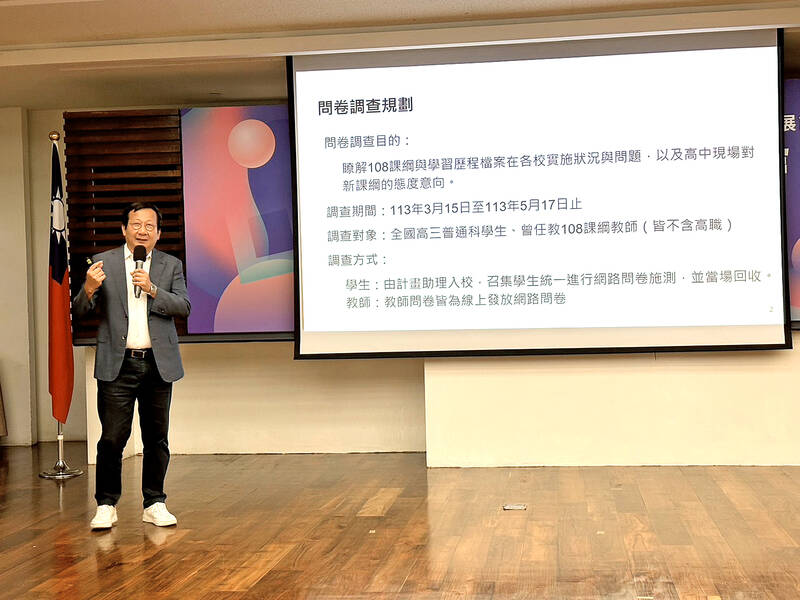Student learning portfolios can help universities make admissions decisions, but up to 5 percent of high-school students said they could not get help from teachers as they prepared them, academics said on Tuesday at a news conference arranged by the Ministry of Education.
The ministry’s curriculum guidelines released in 2019 for 12-year basic education require students to compile a portfolio of their learning outcomes over the three years of high school.
Since 2022, university applicants have been required to submit their portfolios.

Photo: Rachel Lin, Taipei Times
However, some students told education rights group EdYouth that their teachers refused to assist them, with their learning portfolios, causing concern among parents over children’s rights to apply to universities, two professors said.
Lin Kuo-ming (林國明), a professor in National Taiwan University’s Department of Sociology, last year conducted a survey of high-school students and high-school teachers nationwide, with a response rate of 76.39 percent among 2,825 students and 78.32 percent among 1,228 teachers.
About 5 percent of students said that their teachers were unhelpful with their learning portfolios, while 80 percent of teachers said they helped, Lin said.
The survey showed that 70.85 percent of teachers said they could not help due to tight schedules and overwhelming amounts of work, while 69.87 percent said they were uncertain whether the portfolios would matter to professors, Lin said, urging the ministry to write a policy to guide teachers regarding the matter.
Department of Higher Education Director-General Liao Kao-hsien (廖高賢) said that the ministry would collaborate with the Education Administration to prepare a policy and guide teachers to help students collate their portfolios.
Although some students believed the portfolios would give richer students an advantage over others, the research showed that less than 2 percent of students attended cram schools to polish up their portfolios, while satisfaction with their portfolios was not affected by the urban-rural divide, their parents’ occupations and their family’s social status, Lin said.
Eighty percent of teachers believed that producing a portfolio would help students develop abilities and explore their aspirations, while 90 percent of students reported acquiring a new skill from the work, he said.
Underprivileged students tended to believe that the portfolios helped them explore their aspirations and cultivate skills, he added.
The ministry said that it commissioned National Sun Yat-sen University (NSYSU) to research the opinions of professors who have reviewed written applications for admission to universities, with more than 3,300 surveyed every year.
The percentage of professors who read written applications at the second stage of the university admissions process has increased every year, said Shih Ching-lin (施慶麟), a professor in NSYSU’s Institute of Education.
Most professors review 31 to 60 written applications per year and spend about 14 minutes reading each application, Shih said.
Meanwhile, the National Federation of Teachers’ Unions suggested setting a deadline for uploading PDF files of the portfolios, a format allowed in the university admissions process.
Department of Higher Education head Kuo Chia-yin (郭佳音) said that the issue would be examined, with the needs of students of different backgrounds, such as those from experimental education providers, taken into account.
Additional reporting by CNA

Chinese Nationalist Party (KMT) Chairman Eric Chu (朱立倫), spokeswoman Yang Chih-yu (楊智伃) and Legislator Hsieh Lung-chieh (謝龍介) would be summoned by police for questioning for leading an illegal assembly on Thursday evening last week, Minister of the Interior Liu Shyh-fang (劉世芳) said today. The three KMT officials led an assembly outside the Taipei City Prosecutors’ Office, a restricted area where public assembly is not allowed, protesting the questioning of several KMT staff and searches of KMT headquarters and offices in a recall petition forgery case. Chu, Yang and Hsieh are all suspected of contravening the Assembly and Parade Act (集會遊行法) by holding

PRAISE: Japanese visitor Takashi Kubota said the Taiwanese temple architecture images showcased in the AI Art Gallery were the most impressive displays he saw Taiwan does not have an official pavilion at the World Expo in Osaka, Japan, because of its diplomatic predicament, but the government-backed Tech World pavilion is drawing interest with its unique recreations of works by Taiwanese artists. The pavilion features an artificial intelligence (AI)-based art gallery showcasing works of famous Taiwanese artists from the Japanese colonial period using innovative technologies. Among its main simulated displays are Eastern gouache paintings by Chen Chin (陳進), Lin Yu-shan (林玉山) and Kuo Hsueh-hu (郭雪湖), who were the three young Taiwanese painters selected for the East Asian Painting exhibition in 1927. Gouache is a water-based

Taiwan would welcome the return of Honduras as a diplomatic ally if its next president decides to make such a move, Minister of Foreign Affairs Lin Chia-lung (林佳龍) said yesterday. “Of course, we would welcome Honduras if they want to restore diplomatic ties with Taiwan after their elections,” Lin said at a meeting of the legislature’s Foreign Affairs and National Defense Committee, when asked to comment on statements made by two of the three Honduran presidential candidates during the presidential campaign in the Central American country. Taiwan is paying close attention to the region as a whole in the wake of a

OFF-TARGET: More than 30,000 participants were expected to take part in the Games next month, but only 6,550 foreign and 19,400 Taiwanese athletes have registered Taipei city councilors yesterday blasted the organizers of next month’s World Masters Games over sudden timetable and venue changes, which they said have caused thousands of participants to back out of the international sporting event, among other organizational issues. They also cited visa delays and political interference by China as reasons many foreign athletes are requesting refunds for the event, to be held from May 17 to 30. Jointly organized by the Taipei and New Taipei City governments, the games have been rocked by numerous controversies since preparations began in 2020. Taipei City Councilor Lin Yen-feng (林延鳳) said yesterday that new measures by